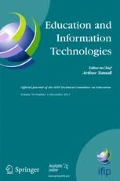Abstract
With development in technologies in educational and industrial sectors students are facing strenuous competitions. Job offers around the world fixate on recruiting suitable graduates with skills, knowledge and problem solving skills. For assuring the learners attainment of cognitive, psychometric and affective levels, Outcome based education (OBE) measures each and every aspect of assessment done by the students from Kalasalingam Academy of Research and Education, India. In this paper a methodological evaluation is done on course outcome (CO) of students learned using different approaches are studied. Based on the result, the introduction of teaching aids in form of digital tools has positive influence over CO attainment. However, adaptability of different approaches was found be difficult for some of student diverse and resulted in decrease in CO attainment % levels.


Similar content being viewed by others
References
Raes, A., Detienne, L., Windey, I., & Depaepe, F. (2019). A systematic literature review on synchronous hybrid learning: Gaps identified. Learning Environments Research, 1–22.
Chandra, V., & Fisher, D. L. (2009). Students’ perceptions of a blended web-based learning environment. Learning Environments Research, 12(1), 31–44.
Yamaguchi, S. N., Kondo, H., Ohnishi, Y., & Nishino, K. (2019). Analysis of learning activities and effects on blended lectures. Procedia Computer Science, 159, 1568–1575.
Khodeir, L. M. (2018). Blended learning methods as an approach to teaching project management to architecture students. Alexandria Engineering Journal, 57(4), 3899–3905.
Yigit, T., Koyun, A., Yuksel, A. S., & Cankaya, I. A. (2014). Evaluation of blended learning approach in computer engineering education. Procedia-Social and Behavioral Sciences, 141, 807–812.
Broadbent, J. (2017). Comparing online and blended learner's self-regulated learning strategies and academic performance. The Internet and Higher Education, 33, 24–32.
Shu, H., & Gu, X. (2018). Determining the differences between online and face-to-face student–group interactions in a blended learning course. The Internet and Higher Education, 39, 13–21.
Kälberer, N., Petendra, B., Böhmer, C., Schibelbein, A., & Beck-Meuth, E. M. (2016). Evaluation process and quality management in a blended-learning bachelor’s programme. Procedia-Social and Behavioral Sciences, 228, 131–137.
Vivek, C. M., Thamilvanan, G., & Mohanasundaram, K. (2019). Influence of activity based assessment in outcome-based education. Test engineering and management, 81, 4524–4528.
Goedhart, N. S., Blignaut-van Westrhenen, N., Moser, C., & Zweekhorst, M. B. M. (2019). The flipped classroom: Supporting a diverse group of students in their learning. Learning Environments Research, 22(2), 297–310.
Author information
Authors and Affiliations
Corresponding author
Additional information
Publisher’s note
Springer Nature remains neutral with regard to jurisdictional claims in published maps and institutional affiliations.
Glossary
- R
-
Rural based students.
- U
-
Urban based Students.
- RWDT
-
Rural students with access to digital tools.
- RWODT
-
Rural students without access to digital tools.
- UWDT
-
Urban students with access to digital tools.
- UWODT
-
Urban students without access to digital tools.
- WDT
-
Students with access to digital tools.
- WODT
-
Students without access to digital tools.
Rights and permissions
About this article
Cite this article
Vivek, C.M., Ramkumar, P. Evaluation of course outcome attainment of engineering course with traditional, blended and flipped classroom approaches. Educ Inf Technol 26, 2225–2231 (2021). https://doi.org/10.1007/s10639-020-10353-7
Received:
Accepted:
Published:
Issue Date:
DOI: https://doi.org/10.1007/s10639-020-10353-7




